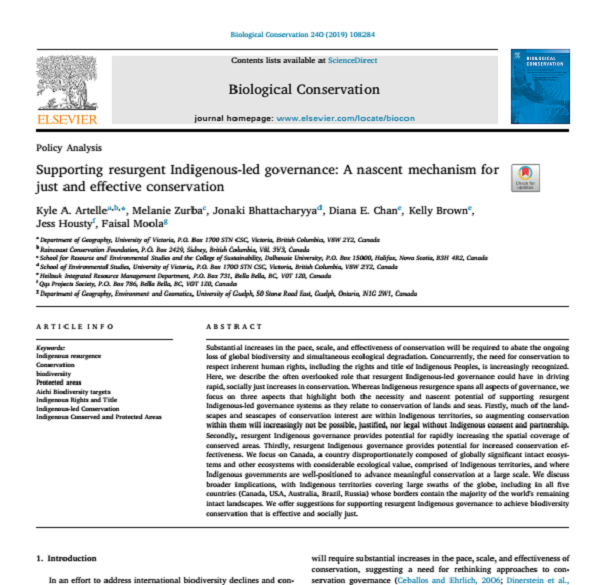First published on 11/22/2019
Supporting resurgent Indigenous-led governance: A nascent mechanism for just and effective conservation, by Kyle A.Artelle, Melanie Zurba, Jonaki Bhattacharyya, Diana E.Chan, Kelly Brown, Jess Housty, Faisal Moola, Biological Conservation, Volume 240, December 2019, 10 pages.
Abstract
Substantial increases in the pace, scale, and effectiveness of conservation will be required to abate the ongoing loss of global biodiversity and simultaneous ecological degradation. Concurrently, the need for conservation to respect inherent human rights, including the rights and title of Indigenous Peoples, is increasingly recognized.
Here, we describe the often overlooked role that resurgent Indigenous-led governance could have in driving rapid, socially just increases in conservation. Whereas Indigenous resurgence spans all aspects of governance, we focus on three aspects that highlight both the necessity and nascent potential of supporting resurgent Indigenous-led governance systems as they relate to conservation of lands and seas.
Firstly, much of the landscapes and seascapes of conservation interest are within Indigenous territories, so augmenting conservation within them will increasingly not be possible, justified, nor legal without Indigenous consent and partnership. Secondly, resurgent Indigenous governance provides potential for rapidly increasing the spatial coverage of conserved areas. Thirdly, resurgent Indigenous governance provides potential for increased conservation effectiveness.
We focus on Canada, a country disproportionately composed of globally significant intact ecosystems and other ecosystems with considerable ecological value, comprised of Indigenous territories, and where Indigenous governments are well-positioned to advance meaningful conservation at a large scale. We discuss broader implications, with Indigenous territories covering large swaths of the globe, including in all five countries (Canada, USA, Australia, Brazil, Russia) whose borders contain the majority of the world’s remaining intact landscapes. We offer suggestions for supporting resurgent Indigenous governance to achieve biodiversity conservation that is effective and socially just.
